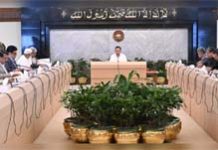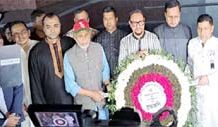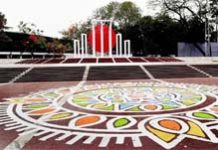C T Online Desk: The nation is observing Genocide Day today, recalling the horrors of the genocide on March 25, 1971 committed by the Pakistani occupation army against the unarmed people of Bangladesh.
Government organisations and political and socio-cultural organisations have taken different programmes to mark the day.
As part of the programmes taken by liberation war affairs ministry, lights will be kept off from 11:00pm to 11:01pm on March 25 throughout the country, to pay homage to those who were killed by Pakistani occupation forces on the dreadful night of 1971.
However, establishments of emergency services will remain out of the purview of the programme, according to an official handout.
On the occasion of ‘Genocide Day’, president Mohammed Shahabuddin and prime minister Sheikh Hasina issued special messages.
A discussion will be held on Monday at 10:30am at the Liberation War Museum.
Cultural programmes will be organised across the country. Exhibitions of rare photographs and screenings of documentaries will be organised in cities, including Dhaka.
Reminiscences and discussions on the genocide will be held in the presence of eminent personalities and freedom fighters in all educational institutions, including schools, colleges, and madrassahs.
Special prayers, seeking eternal peace for the souls of those killed on the fateful night, will be offered at mosques after Zohr prayers tomorrow and at other places of worship at their convenience.
Similar programmes will be organised at the district-upazila level and Bangladesh missions abroad.
The Jatiya Sangsad unanimously adopted a resolution to observe March 25 as ‘Genocide Day’ on March 11, 2017.
Newspapers will publish special supplements on the genocide committed by the occupational Pakistani forces.
The ruling Awami League has organised a rally in front of its Bangabandhu Avenue central office to mark the day.
The main opposition Bangladesh Nationalist Party has also undertaken different programmes, including a freedom fighters’ rally in front of the party’s Naya Paltan central office.
The Workers Party of Bangladesh has also organised a discussion session at the National Press Club, while the Press Club itself will also hold a discussion at the club.
Besides, discussions will be held at all educational institutions, including madrassahs, where heroic freedom fighters and noted personalities will share their memories with students.
The Pakistani military launched its infamous ‘Operation Searchlight’ on March 25, 1971, killing several thousand freedom-loving Bengalis that night alone.
As part of the crackdown, tanks rolled out of Dhaka cantonment, and a sleeping city woke up to the rattles of heavy weapon fires as Pakistani troops attacked Dhaka University halls, then East Pakistan Rifles (now Border Guard Bangladesh) headquarters, Rajarbagh Police Lines, and the Old Town of Dhaka killing several thousand unarmed Bengalis.
People tried to resist the occupational army by barricading streets, felling trees, and engaging in other activities while members of the East Pakistan Rifles and police put up a brave fight with outmoded 303 rifles against heavily armed Pakistani troops.
At midnight, occupational troops raided the residential quarters of Dhaka University teachers and the halls and butchered many teachers and students.
In simultaneous attacks that night, many people were killed and injured in the port city of Chattogram and at other places across the country.
The crackdown set off the nine-month War of Independence led by the Mujibnagar government in exile, which ended with the emergence of independent Bangladesh on December 16, 1971.














